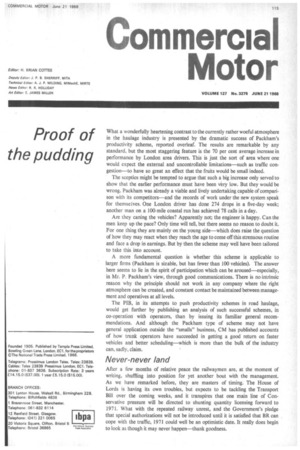Proof of the pudding
Page 117

If you've noticed an error in this article please click here to report it so we can fix it.
What a wonderfully heartening contrast to the currently rather woeful atmosphere in the haulage industry is presented by the dramatic success of Packham's productivity scheme, reported overleaf. The results are remarkable by any standard, but the most staggering feature is the 70 per cent average increase in performance by London area drivers. This is just the sort of area where one would expect the external and uncontrollable limitations—such as traffic congestion—to have so great an effect that the fruits would be small indeed.
The sceptics might be tempted to argue that such a big increase only served to show that the earlier performance must have been very low. But they would be wrong. Packham was already a viable and lively undertaking capable of comparison with its competitors—and the records of work under the new system speak for themselves. One London driver has done 274 drops in a five-day week; another man on a 100-mile coastal run has achieved 78 calls in a day.
Are they caning the vehicles? Apparently not; the engineer is happy. Can the men keep up the pace? Only time will tell, but there seems no reason to doubt it. For one thing they are mainly on the young side—which does raise the question of how they may react when they reach the age to come off this strenuous routine and face a drop in earnings. But by then the scheme may well have been tailored to take this into account.
A more fundamental question is whether this scheme is applicable to larger firms (Packham is sizable, but has fewer than 100 vehicles). The answer here seems to lie in the spirit of participation which can be aroused—especially, in Mr. P. Packham's view, through good communications. There is no intrinsic reason why the principle should not work in any company where the right atmosphere can be created, and constant contact be maintained between management and operatives at all levels.
The PIB, in its attempts to push productivity schemes in road haulage, would get further by publishing an analysis of such successful schemes, in co-operation with operators, than by issuing its familiar general recommendations. And although the Packham type of scheme may not have general application outside the "smalls" business, CM has published accounts of how trunk operators have succeeded in getting a good return on faster vehicles and better scheduling—which is more than the bulk of the industry can, sadly, claim.
Never-never land
After a few months of relative peace the railwaymen are, at the moment of writing, shuffling into position for yet another bout with the management. As we have remarked before, they are masters of timing. The House of Lords is having its own troubles, but expects to be tackling the Transport Bill over the coming weeks, and it transpires that one main line of Conservative pressure will be directed to shunting quantity licensing forward to 1971. What with the repeated railway unrest, and the Government's pledge that special authorizations will not be introduced until it is satisfied that BR can cope with the traffic, 1971 could well be an optimistic date. It really does begin to look as though it may never happen—thank goodness.








































































































































































































